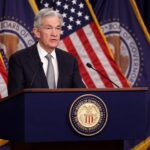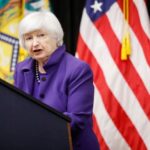By Naveen Athrappully
A key indicator that gauges the health of the American economy fell for the tenth straight month in December, exceeding forecasts and suggesting a potential recession in the months ahead.
The Conference Board Leading Economic Index (LEI) for the United States declined by 1 percent, to 110.5 in December, following a 1.1 percent decrease in November, according to a press release on Jan. 23. For the six-month period between June and December, the LEI has registered a decline of 4.2 percent, which is a “much steeper rate of decline” compared to the 1.9 percent decrease in the previous six months.
“The U.S. LEI fell sharply again in December—continuing to signal recession for the U.S. economy in the near term,” said Ataman Ozyildirim, senior director, economics, at The Conference Board.
“There was widespread weakness among leading indicators in December, indicating deteriorating conditions for labor markets, manufacturing, housing construction, and financial markets in the months ahead,” he said.
Ozyildirim expects the coming quarters to see overall economic activity potentially turning negative before it picks up again in the last quarter of this year.
The 1 percent decline in the LEI exceeded forecasts by a poll of economists by Reuters, which had registered a median expectation of a 0.7 percent decrease.
Meanwhile, The Conference Board’s Coincident Economic Index, which measures current activity, rose by 0.1 percent in December. Among the multiple components of the CEI, only the Industrial Production Index contributed negatively. Industrial production fell for the third consecutive month in December.
The CEI “has not weakened in the same fashion as the LEI because labor market related indicators (employment and personal income) remain robust,” Ozyildirim stated.
Recession Looms
The LEI usually peaks a year ahead of a likely recession on average, according to The Conference Board. It last peaked in February 2022.
“New lows for the U.S. Leading Indicator index. This indicator has a 100 percent hit rate on anticipating recessions with a seven to eight months lag. It’s now pointing to a recession starting in the second quarter, and on par with the 2001 recession. Markets, in the meantime: Soft landing and La-La Land,” Alfonso Peccatiello, the founder and CEO of The Macro Compass, stated in a tweet on Jan. 23.
Among components in the LEI, only three of them—S&P 500 Index of stock prices, interest rate spread, 10-year Treasury bonds less federal funds, and manufacturer’s new orders, consumer goods and materials—registered positive growth.
A January survey by the National Association of Business Economics (NABE) found that more than 50 percent of respondents saw the possibility of a recession in the United States over the next year at 50 percent or higher.
Roughly 20 percent expect employment at their companies to fall in the coming months. Higher interest rates and costs were deemed to be the biggest downside risks for the economic outlook.
Stock Market Impact
In an interview with CNBC on Jan. 23, Liz Young, head of investment strategy at SoFi, said that recession has likely not been priced into stocks. The average stock market decline in a recession comes to 44 percent, she pointed out.
The market has to fall at least 30 percent from its recent highs in order to suggest that the possibility of a recession has become a serious thought in the minds of investors.
Given the current level of the market, the S&P 500 will have to fall by 16 percent. If there is a meaningful decline in corporate profits, it could also indicate a deeper recession, Young suggested.
A December survey of economists by Bloomberg found that the odds of a recession in the United States this year was seven in 10, up from 65 percent in November. Consumer spending is expected to barely grow in the middle half of 2023. Roughly two-thirds of the U.S. GDP is accounted for by consumer spending.






